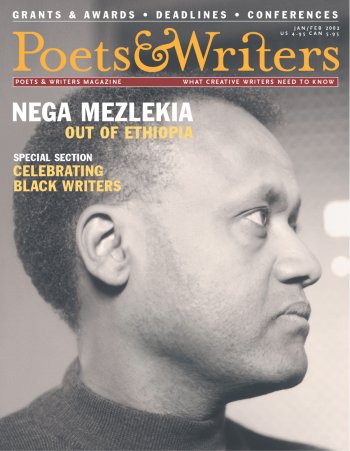
Our cover story is a profile of Ethiopian memoirist Nega Mezlekia, whose second book, the novel The God Who Begat a Jackal, is equal parts love story, anthropological study, and history of a nation on the brink of religious war.
Jump to navigation Skip to content

Our cover story is a profile of Ethiopian memoirist Nega Mezlekia, whose second book, the novel The God Who Begat a Jackal, is equal parts love story, anthropological study, and history of a nation on the brink of religious war.
Ethiopian exile Nega Mezlekia's memoir, Notes From the Hyena's Belly, details his remarkable boyhood in Jijiga, a city in the eastern part of the Horn of Africa built on a "dry, sandless desert where even the smallest wind creates devils—whirlwinds of dust that rise high into the heavens and are visible from miles away."
An essay on the writing of John Edgar Wideman.
An essay on the writing of Samuel R. Delany.
An essay on the writing of Nella Larson.
Third World Press, one of the largest independent black publishers in the country.
An essay on the writing of Afaa Michael Weaver.
An essay on the writing of James Alan McPherson.
The Academy of American Poets, the 68-year-old literary nonprofit, has made headlines recently, but not for its latest party or prizewinner. In September the organization, best known for founding National Poetry Month, announced that Executive Director William Wadsworth had been asked to resign by board of directors president Henry Reath. And on November 7, the board voted to lay off eight of the Academy's seventeen employees and to subdivide its new office and rent out half of the space, which the group had renovated and moved into in August.

A number of literary magazines—APR, Fence, McSweeney's, Open City, Pearl, Pleiades, and Verse—have in recent years pursued book publishing ventures, usually ones that include an annual book contest. Putting an electronic twist on that trend is the bimonthly online literary magazine Slope. This spring, founding editor Ethan Paquin is making the jump from Web journal to print press by launching Slope Editions, which will publish two or three books of poetry annually.
In honor of poet Robert Bly's 75th birthday last month, the Minneapolis-based Loft Literary Center, in conjunction with the McKnight Foundation, revived Bly's innovative literary magazine—originally titled The Fifties, in honor of the decade in which it was founded—by publishing the first issue of The Thousands.

The Great Books Foundation, which for more than 50 years has been reminding the public that a book replete with sophisticated ideas and a "good read" are not mutually exclusive, has brought that same philosophy to a new magazine. The Common Review aims to deliver the riches of intellectual engagement to a general reading audience.
A profile of debut novelist Nicholas Montemarano.
The books that bolstered writers after the September 11 attacks.
A writer weighs the importance of factual accuracy while writing fiction based in history.